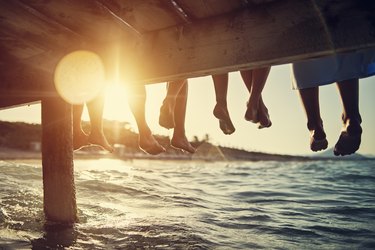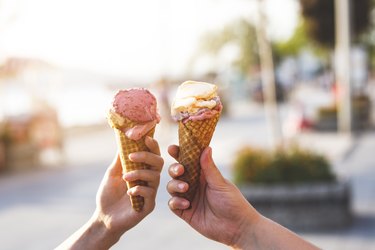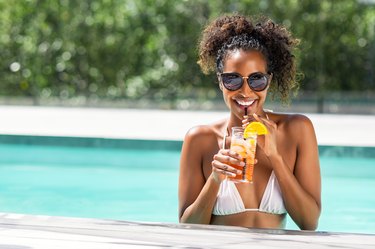
Summers are meant to be enjoyed — fully. Many of us spend months upon months cooped up in our homes, waiting for warmer temps and sunshine. And when summertime comes, we should be out getting in as much beach time, bike rides, hiking and barbecuing as possible.
But while most of us are aware of our tendency to gain some winter weight, we might be less conscious of the pounds we may put on over the summer. It's not the end of the world if we're out enjoying ourselves and are able to balance it out in the fall, but there are a few potential pitfalls to be aware of.
Video of the Day
Video of the Day
The good news is, there are some simple tweaks to avoid them, without taking out all the fun.
1. Lack of Sleep
Sleep and your weight are connected in many ways. Losing shut-eye can throw your hormones off track and cause your body to hold onto its fat stores. Plus, when you're tired, it's harder to manage your food cravings.
There are a few reasons you may be missing out on some sleep during the summer:
- You're out later at night. During winter, it's common to find yourself already in comfy clothes and on the couch by 7 p.m. Summer's long days and warmer temperatures may lead to you staying out later, and potentially missing a few hours of precious sleep.
- The change in the season itself. If your AC isn't cutting it, and your bedroom reaches 75 degrees Fahrenheit at night, you'll likely wake up. The number isn't exact, according to the National Sleep Foundation, but there is an agreement that a cooler room, closer to 65 degrees, is optimal for sleeping. With summer come longer days as well, which means it may still be light out at bedtime. This, too, can also put a damper on your quality of sleep.
- You're drinking more alcoholic beverages. Yes, drinking alcohol can make you feel drowsy and even help you fall asleep, but it isn't doing you any favors when it comes to how well you're sleeping, per the National Sleep Foundation. In fact, drinking before bed worsens your quality of sleep by interrupting your sleep rhythms, circadian rhythms and simply causing extra trips to the bathroom.
How to Get Enough Shut-Eye
First, just be aware of the link between lack of sleep and weight gain. Avoid drinking before bed if you can and create a sleep-friendly bedroom by lowering the temperature closer to 65 degrees Fahrenheit and shutting your blinds or curtains to block out extra light.
2. Ice Cream, BBQs and Other Summer Treats

The foods of summer — pasta and potato salad, pie, ice cream cones, funnel cakes and so on — are so much of what make summer, well, summer. Getaways, beach days and weekend barbecues can make it hard not to take in too many extra calories from these temptations.
How to Enjoy Your Favorite Summer Foods
Don’t skip out on these foods entirely, but keep your portions in check. Try to balance indulgent options with other in-season foods like green salads, fresh corn on the cob, watermelon, peaches and strawberries.
3. Vacation Mode
Going on vacation or just being in vacation-mode (hello, summer Fridays) means a more relaxed pace of life, which often results in less structure in our days. It's healthy for us to take a beat — it's good for our mental wellbeing — but be conscious of how this may be affecting your eating and drinking patterns, along with your physical activity.
Long weekends can wreak havoc on the daily routines and healthy habits you may have established. It can be harder to schedule workouts, when and what you're eating can become a little haphazard and the drinking can certainly be ratcheted up a notch.
How to Navigate Vacation Mode
4. Cold Summer Drinks

When it's hot out, nothing is better than a cold, refreshing adult drink. Trouble is, many of these, like a frozen margarita or daiquiri, are high in calories and sugar. Case in point: A typical frozen margarita has about 275 calories and 36 grams of sugar, according to the USDA.
Adding to this, our summer beverage arsenal has exploded as of late. The go-to beer, wine and spirits have expanded to hard seltzer and kombucha, canned wine, wine-based cocktails, etc. And it's those ready-made cocktails that appear to be our bev of choice, according to a May 2019 report from Nielsen. This is fine, but knowing how many calories or grams of sugar are in some of those drinks can be tricky to find out.
How to Manage Summer Drinks
Drink in moderation and alternate between a drink and a glass of water if you have a few drinks. Stick to the lower sugar options you’re familiar with, or if you do branch out, look for products that provide nutrition information like June Shine, a delicious and transparent brand of hard kombucha or High Noon, a hard seltzer.
Ready to Lose Weight?
Set yourself up for success with LIVESTRONG.com's 30-Day Weight-Loss Kickstart.
- Sleep Foundation: "How to Sleep Comfortably Through Hot Summer Nights"
- Sleep Foundation: "The Bedroom Environment"
- Sleep Foundation: "How Alcohol Affects the Quality—And Quantity—Of Sleep"
- USDA: "Frozen Margarita"
- Nielsen: "This Memorial Day Americans Will Substitute Summer CPG Staples for Alternatives"